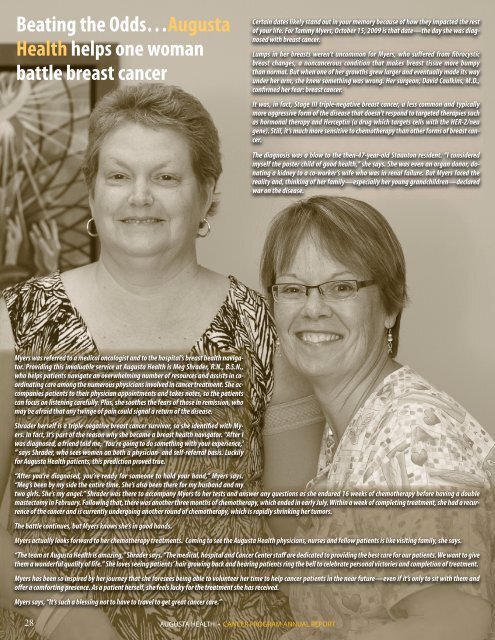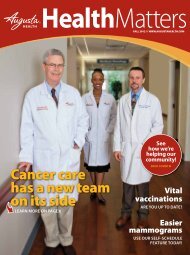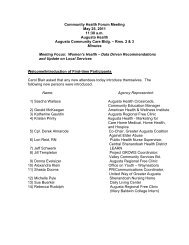2011 Cancer Program - Augusta Health
2011 Cancer Program - Augusta Health
2011 Cancer Program - Augusta Health
You also want an ePaper? Increase the reach of your titles
YUMPU automatically turns print PDFs into web optimized ePapers that Google loves.
Beating the Odds…<strong>Augusta</strong><br />
<strong>Health</strong> helps one woman<br />
battle breast cancer<br />
Myers was referred to a medical oncologist and to the hospital’s breast health navigator.<br />
Providing this invaluable service at <strong>Augusta</strong> <strong>Health</strong> is Meg Shrader, R.N., B.S.N.,<br />
who helps patients navigate an overwhelming number of resources and assists in coordinating<br />
care among the numerous physicians involved in cancer treatment. She accompanies<br />
patients to their physician appointments and takes notes, so the patients<br />
can focus on listening carefully. Plus, she soothes the fears of those in remission, who<br />
may be afraid that any twinge of pain could signal a return of the disease.<br />
Shrader herself is a triple-negative breast cancer survivor, so she identifi ed with Myers.<br />
In fact, it’s part of the reason why she became a breast health navigator. “After I<br />
was diagnosed, a friend told me, ‘You’re going to do something with your experience,’<br />
” says Shrader, who sees women on both a physician- and self-referral basis. Luckily<br />
for <strong>Augusta</strong> <strong>Health</strong> patients, this prediction proved true.<br />
“After you’re diagnosed, you’re ready for someone to hold your hand,” Myers says.<br />
“Meg’s g been by y my y side the entire time. She’s also been there for my y husband and my y<br />
Certain dates likely stand out in your memory because of how they impacted the rest<br />
of your life. For Tammy Myers, October 15, 2009 is that date—the day she was diagnosed<br />
with breast cancer.<br />
Lumps in her breasts weren’t uncommon for Myers, who suff ered from fi brocystic<br />
breast changes, a noncancerous condition that makes breast tissue more bumpy<br />
than normal. But when one of her growths grew larger and eventually made its way<br />
under her arm, she knew something was wrong. Her surgeon, David Caulkins, M.D.,<br />
confi rmed her fear: breast cancer.<br />
It was, in fact, Stage III triple-negative breast cancer, a less common and typically<br />
more aggressive form of the disease that doesn’t respond to targeted therapies such<br />
as hormonal therapy and Herceptin (a drug which targets cells with the HER-2/neu<br />
gene). Still, it’s much more sensitive to chemotherapy than other forms of breast cancer.<br />
The diagnosis was a blow to the then-47-year-old Staunton resident. “I considered<br />
myself the poster child of good health,” she says. She was even an organ donor, donating<br />
a kidney to a co-worker’s wife who was in renal failure. But Myers faced the<br />
reality and, thinking of her family—especially her young grandchildren—declared<br />
war on the disease.<br />
two girls. She’s my angel.” Shrader was there to accompany Myers to her tests and answer any questions as she endured 16 weeks of chemotherapy before having a double<br />
mastectomy in February. Following that, there was another three months of chemotherapy, which ended in early July. Within a week of completing treatment, she had a recurrence<br />
of the cancer and is currently undergoing another round of chemotherapy, which is rapidly shrinking her tumors.<br />
The battle continues, but Myers knows she’s in good hands.<br />
Myers actually looks forward to her chemotherapy treatments. Coming to see the <strong>Augusta</strong> <strong>Health</strong> physicians, nurses and fellow patients is like visiting family, she says.<br />
“The team at <strong>Augusta</strong> <strong>Health</strong> is amazing,” Shrader says. “The medical, hospital and <strong>Cancer</strong> Center staff are dedicated to providing the best care for our patients. We want to give<br />
them a wonderful quality of life.” She loves seeing patients’ hair growing back and hearing patients ring the bell to celebrate personal victories and completion of treatment.<br />
Myers has been so inspired by her journey that she foresees being able to volunteer her time to help cancer patients in the near future—even if it’s only to sit with them and<br />
off er a comforting presence. As a patient herself, she feels lucky for the treatment she has received.<br />
Myers says, “It’s such a blessing not to have to travel to get great cancer care.”<br />
28<br />
AUGUSTA HEALTH • CANCER PROGRAM ANNUAL REPORT





